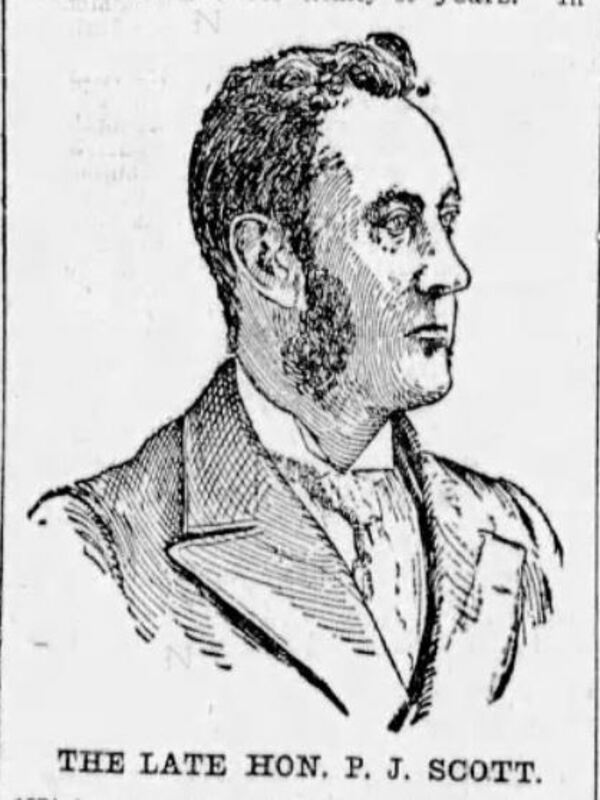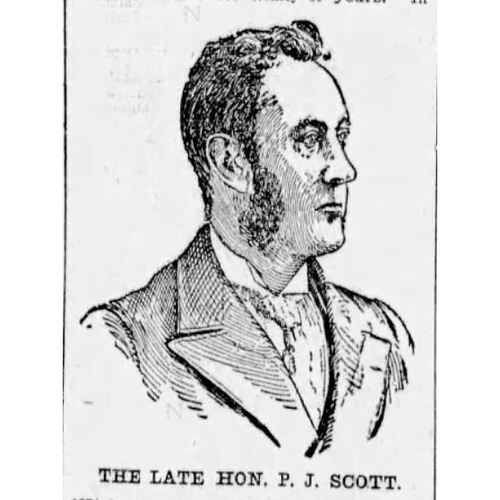
Source: Link
SCOTT, PATRICK J., lawyer and politician; b. 25 Dec. 1848 in St John’s; m. there 2 Dec. 1882 Eleanor Margaret Little of Charlottetown, sister of Philip Francis Little and Joseph Ignatius Little*; d. 22 Oct. 1899 in St John’s.
Educated at St Bonaventure’s College, Patrick J. Scott studied law, first in 1867 with George James Hogsett* and later with John Little. He was admitted to the Newfoundland bar on 25 March 1872. The following year he began his long career in politics as a member of the anti-confederate and predominantly Roman Catholic Liberal party. Along with Maurice Fenelon and Lewis Tessier, Scott won election by acclamation in the three-member district of St John’s West, a feat they would accomplish again in 1874 and 1878. A member in 1873 of the anti-confederate government of Charles James Fox Bennett*, after 1874 Scott sat as a member of the Liberal opposition. He developed a strong reputation as an orator and a finance critic of the Conservative governments of Frederic Bowker Terrington Carter and William Vallance Whiteway*, who had discarded the confederation issue in favour of resource development through railway construction. This position came to be shared by the Liberals, who in 1882 allied themselves with Whiteway to win the general election held in that year. Their opponents were a coalition of Water Street merchants, united under the label of the New party, who opposed railway construction.
In early 1885 this alliance disintegrated following the withdrawal of Liberals, including Scott, upset over Whiteway’s failure in the legislature to distance himself from a New party resolution critical of verdicts in the trials of Roman Catholics involved in a violent sectarian clash at Harbour Grace in December 1883 [see Robert John Kent]. Promised a judgeship, Whiteway resigned as premier in favour of Water Street merchant Robert Thorburn*, who led a united Protestant group to victory against the Liberal party in the general election on 31 Oct. 1885. Despite promises of “no amalgamation with the Liberals” during the campaign, Thorburn privately informed senior Liberals that their support would be sought after the election. Scott was successful in St John’s West, but significantly he did not poll the highest vote. That honour went to an ambitious and populist 26-year-old lawyer, independent Edward Patrick Morris*.
On 26 July 1886 Thorburn reached a political accommodation with senior Roman Catholics, which resulted in the appointment of Fenelon and William J. S. Donnelly to his cabinet. With the withdrawal from active politics of Kent and Sir Ambrose Shea*, Scott became the spokesman in the House of Assembly for the Liberal mhas who remained officially in opposition but generally supportive of the Thorburn government. Although an avowed anti-confederate, in 1888 Scott accepted Thorburn’s invitation to be one of several delegates he proposed sending to Ottawa to see what terms of union Canada might be willing to offer Newfoundland. However, Thorburn in September had to cancel the talks when Whiteway denounced such efforts and anti-confederates mobilized Roman Catholic opposition to confederation. Scott later justified his selection as a delegate on the grounds that he had no more right “to say that we shall not have Confederation than that we shall.”
In August 1888 Scott associated himself politically with prominent merchant Moses Monroe, a large employer of labour in the west end of St John’s. Scott helped Monroe win election on 30 August to a seat on the town’s first municipal council and thus became part of a growing political rivalry between Monroe and Morris, both of whom sought influence in St John’s through municipal patronage. In the general election on 6 Nov. 1889 Scott and several other Liberal mhas followed Monroe into the government ranks, and Morris became part of a revitalized Whiteway opposition, which won a landslide victory. In St John’s West Morris and his two running mates easily defeated the government candidates led by Scott. This election witnessed the end of the Liberal party as it had been constituted since the 1830s – based on an appeal to Roman Catholicism and Irish nationalism – and saw the emergence of Catholic loyalties determined by economic issues, a process that had been interrupted by the Liberal defection from Whiteway’s government in 1885. Despite Scott’s protestations, however, Morris and Whiteway now claimed the Liberal name for their party.
Scott remained active in tory opposition politics after 1889. In 1890 he was one of two delegates the tories sent to England to protest unpopular imperial policies concerning French fishing rights on the west coast of Newfoundland [see Monroe]. On 6 November that year he ran unsuccessfully against a strong Morris candidate in St John’s East, a seat made vacant by the death in July of John Joseph Dearin*. In the general election held on 6 Nov. 1893 he returned to his native district of St John’s West to run with Monroe for the tories. He was again defeated. His candidacy had followed a half-hearted attempt in July to join the Liberal party, but he apparently broke off these overtures because of misunderstandings on both sides.
After its defeat in the 1893 election the opposition filed petitions in the Supreme Court under the Corrupt Practices Act of 1889 charging 17 government members with the misuse of public funds during the campaign. As a result Whiteway, Morris, and others were unseated and the government was forced to resign on 11 April 1894. A new ministry, led by tory merchant Augustus Frederick Goodridge, took office. By-elections, to be held later that year in those districts where Liberals had been unseated, would determine whether he had a majority in the assembly.
Scott had acted as counsel for petitioners seeking to unseat Morris in St John’s West, but in late April 1894 he resigned, claiming that the Goodridge government was holding office despite the democratic wishes of the people. He then joined the opposition Liberals and, with Morris’s endorsement, won a by-election on 10 November in St John’s West. Having won most of the by-elections, on 13 December the Liberals under Daniel Joseph Greene formed a new administration and Scott was appointed receiver general the following day. In the general election on 28 Oct. 1897 he chose to run in the district of Placentia and St Mary’s instead of St John’s West, answering his party’s call for a strong candidate to oppose tory W. J. S. Donnelly. Scott and Morris both denied rumours that Morris did not want Scott to run in St John’s West, but nevertheless, if he had, he probably would, like Morris, have been re-elected. In Placentia and St Mary’s he lost badly, a result that was duplicated by the government members in the island as a whole.
In October 1899 Scott was planning to contest a forthcoming by-election in St John’s East when he died suddenly of heart failure. “A brilliant speaker” and a “master of parliamentary tactics,” he had been well liked politically by both friend and foe. His early political career owed much to the influence of senior leaders in the Roman Catholic church and the community, and his failure in the early 1890s was due to Morris’s ability to establish a power base in St John’s independent of the church. In the end Scott owed his political survival after 1894 to Morris, and of the two men Morris was the stronger personality.
Basilica of St John the Baptist (Roman Catholic) (St John’s), Reg. of marriages, 2 Oct. 1882 (mfm. at PANL). PRO, CO 199/90 (copy at PANL). Daily News (St John’s), 23 Oct. 1899. Evening Herald (St John’s), 23 Oct. 1899. Evening Mercury (St John’s), 11 Nov. 1889. Evening Telegram (St John’s), 23 Oct. 1899. Newfoundlander, 11 Nov. 1873, 3 Nov. 1874, 4 Nov. 1878. Nfld. men (Mott), 37. Melvin Baker, “The government of St. John’s, Newfoundland, 1800–1921”
Cite This Article
Melvin Baker, “SCOTT, PATRICK J.,” in Dictionary of Canadian Biography, vol. 12, University of Toronto/Université Laval, 2003–, accessed February 16, 2026, https://www.biographi.ca/en/bio/scott_patrick_j_12E.html.
The citation above shows the format for footnotes and endnotes according to the Chicago manual of style (16th edition). Information to be used in other citation formats:
| Permalink: | https://www.biographi.ca/en/bio/scott_patrick_j_12E.html |
| Author of Article: | Melvin Baker |
| Title of Article: | SCOTT, PATRICK J. |
| Publication Name: | Dictionary of Canadian Biography, vol. 12 |
| Publisher: | University of Toronto/Université Laval |
| Year of publication: | 1990 |
| Year of revision: | 1990 |
| Access Date: | February 16, 2026 |



